Twenty years ago today the US and the UK invaded Iraq in a disastrous military mission based on flawed intelligence, months of lying to the world, and a casual disregard for international law.
The invasion would lead to hundreds of thousands of civilian deaths, decades of civil war and vicious sectarian violence in Iraq, and the rise of the Islamic State militant group. Incubated in a US prison camp, IS was directed and staffed in part by former members and officers of the Saddam-era Ba’ath party.
In a pattern that would be repeated again and again over the following two decades of the “war on terror”, the US and its allies, including the United Kingdom, assumed that overwhelming technical and military superiority was all they needed to control a distant nation and its people.
A “shock and awe” bombing campaign showcasing that military power launched the invasion, and ground troops moved into Iraq the next day, 20 March. Saddam was soon on the run, and in early April, Baghdad was formally occupied.
On 1 May, US president George Bush set up a theatrical spectacle on an aircraft carrier, flying in to announce “mission accomplished”. America had ended “major combat operations” in Iraq.
It was a speech that betrayed American arrogance, ignorance and disdain about realities on the ground in Iraq, where decades of bloodshed were only just beginning.
The damning Chilcot report on Britain’s involvement in the war later found that the UK had chosen to join the invasion before peaceful options had been exhausted, and then the prime minister Tony Blair had deliberately exaggerated the threat posed by Saddam Hussein.
Britain’s intelligence agencies produced “flawed information”, working from the start on the misguided assumption that Saddam had weapons of mass destruction, and made no attempt to consider the possibility that he had got rid of them, which he had.
Blair ignored warnings that Iraq could degenerate into civil war after the invasion, including from US secretary of state, Colin Powell who accurately predicted “a terrible bloodletting of revenge after Saddam goes”.
The British government had no post-invasion strategy and no influence on Iraq’s postwar US-run administration.
Overall, Britain did not achieve its objectives in Iraq, Chilcot found. The war undermined US and British authority on the international stage, with the reputational damage continuing until today, when it has hampered efforts to gather support for Ukraine’s fight against the Russian invasion.
The west’s strategic mistakes were Iraq’s enduring tragedy. Catastrophic mishandling of the occupation included the “de-Ba’athification” campaign, a mismanaged effort to purge the country of Saddam’s influence.
Thousands of former government employees and soldiers were suddenly without a future in the new US-dominated state, and they turbocharged the insurgency.
The Abu Ghraib prison became a byword for US abuse when photographs and accounts of detainees tortured there were leaked to the press. Iraq’s cultural heritage was looted as US troops stood by and watched.
And for two decades, civilians died in terrible numbers at the hand of all parties to the conflict, in shootings, suicide bombings, air raids and crossfire. Chilcot found the government had not tried hard enough to keep a tally of Iraqi civilian deaths.
Here the Observer tells the stories of five Iraqis affected by the invasion, and the violence it unleashed.
Killed by US troops
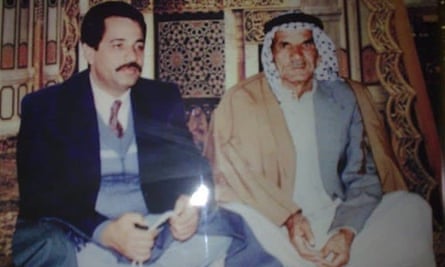
Showkat Abdullah al-Mashhdani
Born in 1950 in Baghdad, he got his PhD in agricultural sciences at the University of Arizona, before returning to Iraq, to pursue a distinguished career in research and business.
He was shot by US forces on the evening of 26 July 2007, one of thousands of civilians killed by coalition troops. His wife Wakkara and son Wathik Showkat, an engineer, spoke to the Observer
Showkat: Our house is in the Ameriah area, near the airport highway. My father was murdered there by US marines, who targeted him intentionally with the heavy machine gun mounted on their Humvee.
He heard heavy shooting and went out to help our neighbours’ kids get safely into their homes, but he was shot just outside our gate, and passed away immediately.
The US forces came to our house then, and after a search of course they found nothing – just us, his family were there.
When they realised from all the documents and certificates that he was an academic all his life, who had even studied in the US, they changed their position.
They offered us $10,000 in compensation but we rejected that, because they murdered him in cold blood even though he was only trying to help kids.
He left behind my mother, and seven children. We are two brothers – a pharmacist and an engineer – and five sisters – a pharmacist, engineer, two teachers and a doctor. Our father was very kind and always looked after everything for all his family.
Wakkara: We blame the US army for destroying our life. He was my best friend as well as my husband and I feel that life stopped completely after his death. I am just waiting to join him.
My health suffered a lot and now I have to take all kinds of medication for high blood pressure and diabetes, caused by the shock.
It is very painful going over my memories of life together. We lived in the US for 10 years, and he had so many offers to join international companies there and in other countries, but he insisted that we come back to Iraq so he could serve his country.
We did not realise that Americans would murder him in this way. We consider what happened an execution by the US government of an innocent scientist who never hurt anyone, and whose only interest was research to improve his country and the world.
You can see the signs of grief in every corner of our house. We have tried to preserve his memory here, starting with his work in the garden, his trees, his beehives, even his homemade fertilisers.
Tortured at Abu Ghraib
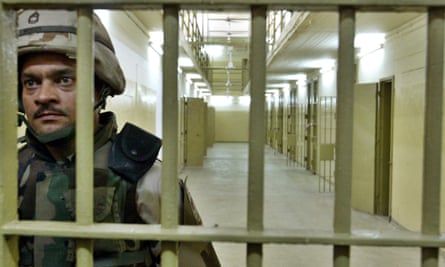
Abu Omar al-Timimi
A member of a farming family that lives in the Al Zaidan area west of Baghdad. After the invasion, the area became a centre for insurgents targeting the city, and he was detained after a false accusation
I was born in Abu Ghraib town, my family are mostly farmers. I was 22 when the US invaded, and ran an agricultural yard selling produce from the area (one of the most fertile in Iraq).
In early 2004, US troops came to my yard and arrested me and another farmer. They took us to a jail at Baghdad airport for two weeks of interrogation. They focused on whether I knew any fighters or had any contacts with them and they found nothing, believe me, but they sent me to Abu Ghraib anyway.
I found out later that I was arrested because of a false accusation by a man who had good contacts with the US army, who wanted to take over my business. He said I was working with insurgents, so they sent me to prison.
In Abu Ghraib I was tortured without facing any interrogation. The guards just did it for their own entertainment.
A woman and four or six other jailers made me run naked down a long corridor, then ordered me to sit in a frog squat, using a whistle. They had a terrifying dog, ready to attack if I failed.
We were about 70 in the cell and we all faced the same torture. She also had a plastic baton and would touch my genitals when she ordered me to squat, and threatened to do worse things.
The American director of the prison knew this was happening, but did nothing.
They kept me there for three months, and I was tortured at least once a week, then they sent me to Camp Bucca prison in Basra, which felt like paradise in comparison.
They finally released me without charge at the end of 2005, and gave me just $20, even though my wallet had about 300,000 dinars (over $200) when I was arrested, the proceeds from a day’s sales at the yard.
When I got back home I kept having nightmares about the jailer in the light green T-shirt. I see her face in my mind all the time, and even today she still frightens me. If I saw her or any of the others again I would take revenge directly because they destroyed my whole life for no reason.
From Ba’ath party member to Islamic State militant
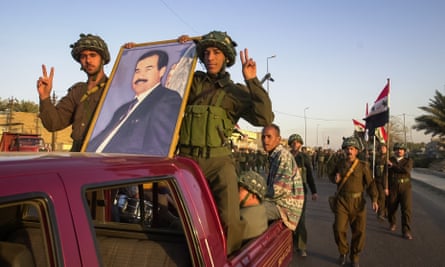
Abu Abdullah al-Hialy
Like many other Iraqi state employees he was a member of Saddam Hussein’s Ba’ath party. After the invasion he lost his job in an ammunition factory, because of the disastrous “de-Ba’athification” policy pursued by the US. He joined the insurgency, fighting with different groups for a decade, until he was jailed in 2014 as a member of the Islamic State militant group.
His son Abdulla: I was born in 1998 and I was five years old when the invasion happened, so I can’t remember it clearly, it feels like a bad dream. I cannot forget the missiles attacks on the military sites near our house.
My father worked in a factory making artillery shells before the invasion and he was a member of Ba’ath party, like all his colleagues. After the invasion he was fired from his job under the de-Ba’athification law. In 2005, my father, along with many others from our region, joined groups that called themselves the resistance, and he fought the US army for two years.
Then he joined the Awakening forces [a Sunni movement that partnered with the US to fight other insurgent groups, including al-Qaida in Iraq, a precursor of Islamic State, and those linked with Iran], partly to avoid being chased by the government security forces.
He continued with them until the end of 2011, when these forces were dissolved, and he joined other resistance groups. Finally one came under Islamic State. He was arrested in our house, when security forces detained his friend and he led them to my father. He was jailed for life, after he was badly tortured and forced to sign a confession without even reading it or knowing what it said. He was a member of the Islamic State militant group, but they sentenced him for crimes he did not commit. We appealed against my father’s sentence three years ago, because of the torture. They reduced it from life in prison to 15 years.
For me, maybe my father was right at the beginning to join the resistance to fight the US invaders, as he lost his job. We believe that the US invasion was the most dangerous thing that happened to Iraq. But I never supported him joining the radical Islamic groups.
Exiled by Saddam
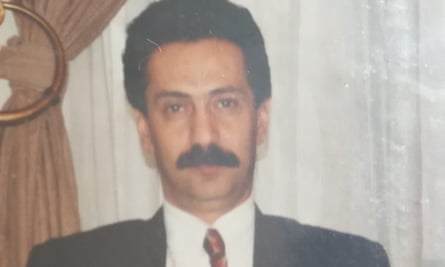
Saad al-Muttalibi
A member of Baghdad city government and former senior aide to Nouri al-Maliki, prime minister of Iraq between 2006 and 2014, and later vice-president.
I was sentenced to death in 1981 but managed to escape, so I was a refugee in many countries. I started that part of my life in Iran then I came to London, and I was working in IT.
I remember walking through Hyde Park when the statue [of Saddam] fell. I had really mixed feelings. I was insulted that foreign armies were invading Iraq, but at the same time I felt like millions of Iraqis, I was relieved that Saddam was going.
All in all, I don’t think Iraqi people or the state of Iraq would have got rid of Saddam Hussein and his family if it wasn’t for the international coalition.
And I do remember the years of Saddam Hussein’s regime, all the carnage and suffering that he caused the people of Iraq and my family. So I wasn’t sorry, and many many people I know weren’t sorry, that Saddam had gone.
I couldn’t go back straight away, I had businesses and obligations in the UK, so at the beginning of 2005 I came back to Iraq. It was very emotional.
At the beginning, when I entered Baghdad, I was surprised at the amount of destruction, even the trees were sad, they were not green, dust covered everywhere. This was my country, I was happy but disappointed, it was a real mixed feeling.
The thing that really upset me was seeing a US army vehicle with sign “stay back 100 metres”. I thought how are these people going to assist in building Iraq, when they say Iraqis must stay 100 metres away from them. No question about it, there must have been better ways to get rid of Saddam and better ways to rescue the nation, that wasn’t the right way to go about it.
I don’t think there is a family in Iraq that wasn’t touched either by the Americans or Saddam or Islamic State or al-Qaida or one of these factions. Definitely my family was affected, not my immediate family, but cousins and close relatives. I myself had some terrible experiences but somehow came through alive.
I was just a few metres away from a car bomb, the miracle of a car between me and the bomb blocked the main impact of the explosion. Another time there was an attempted kidnap, and another explosion.
It is a dilemma, really. With all the suffering, the pain, the destruction, the loss of billions of dollars and the squandering of the wealth of Iraq, even after all that, I still have hope for the future. So was it worth it? Unfortunately. yes.
Cultural destruction
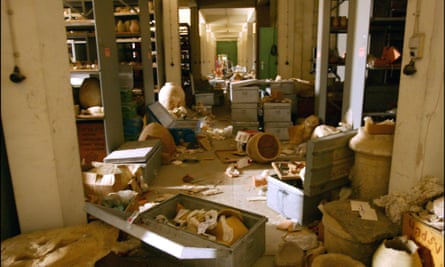
Luma Yas al-Duri
Having worked across all departments of the Iraq museum, she was head of the education department at the time of the invasion, when the priceless collection was looted as US troops stood by outside.
I have horrible memories of the first days of the invasion. My neighbourhood [Mansour in the city’s west] was being bombed all the time, because it contains several important government sites, including the headquarters of the Iraqi air force which was very close to my home.
The sound of the airstrikes has stayed with me until now. There were also Iraqi intelligence offices nearby, and other secret units in the middle of residential areas. So everyone was terrified of being under attack from US jets.
At the start of the war, when airstrikes and missiles were the biggest danger, we spent our nights hiding in shelters, and in the daytime we would look for safer places to stay in the west or the north of Baghdad.
Really those were nightmare days, which left us struggling just to stay alive. That was our main goal, but I was also very worried about the possible looting of the museum.
I had spent 18 years working there, I knew every piece, because my job was to explain their details and history to visitors. So for me each of them was like one of my children, I couldn’t forget about a single one of them.
Before the invasion, the museum staff had decided to pack all the antiquities in wooden boxes, and transfer them to the main storage area, to avoid damage from airstrikes or looting. Only the Assyrian hall was not packed up, because it holds some very large and heavy antiquities.
I live nearby, so when I saw the first video on television of people looting the museum, I contacted our director, “Mr Donny”, George Youkhanna. He spoke to the US military, but they said they had no orders to protect the museum.
In May 2003 we decided to go back inside.
We saw terrible damage to all the cases, and all the halls, then we discovered they had entered the main storage area and stolen unique and extremely valuable items.
This meant the thieves must have been very professional and specialised in our work. We started crying about what happened to the museum, while US armoured vehicles were standing by the gate of the museum.
They did not prevent it, or stop anyone entering and stealing everything, and when Mr Donny argued with them, they just said: “We had no orders to do that.”
Archeology was badly damaged across the country as most guards at historical sites fled their posts. The looting of the Iraqi museum is the most serious organised robbery of cultural heritage in history, and it was carried out with the help of the US army.
